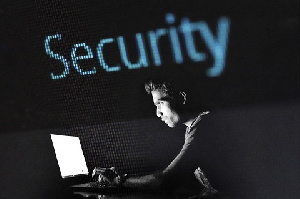According to the latest social media report by Hootsuite, there are about 4.2 billion social media users. These users, although some may represent businesses, organizations or other non-human entities, represent real people who connect with other users daily.
However, as the advancement of technology and social media use increase, so do various internet or social media-related crimes and unethical habits also take new forms. The most prominent social media crimes include identity theft and “phishing”.
Phishing is a cybercrime in which a target or targets are contacted by email, telephone or text message by someone posing as a legitimate institution to lure individuals into providing sensitive data such as personally identifiable information, banking and credit card details, and passwords.
These crimes may happen when attackers get access to your social media accounts. In this report, Dubawa Ghana has compiled five ways to help secure your social media accounts.
1. Enable Two-Factor Authentication on all accounts (2FA)
One effective way to protect any social media account is to enable two-factor authentication in your account. Two-factor authentication allows web services secondary access to the account owner in order to verify a login attempt. In most cases, this involves a phone number and / or an email address.
When a new device or an Internet Protocol (I.P) address tries to log in to any social media account, you use your mobile phone to verify your identity by either clicking on a text or emailed link or typing in a number sent by an authenticator app. This prompts an account owner of any log in from anywhere around the world.
Aside from linking your phone number to your two-factor authentication, a very effective way is to use an authenticator app. This is helpful in times of no cellular access. Some authenticator apps include Duo, Google authenticator and Authy.
To turn your two-factor authentication on, check the “security” section of your “settings” on any social media service you have signed on to.
2. Choose a strong password
Probably the first step to making sure your account is secure, choosing a strong password is very important. Always endeavour to use passwords that are hard to guess, even by your very close friends and family.
Do not use popular jargons that you share with other people. Try to mix alphabets, numbers and symbols in your password and try as much as possible to change it often. You should choose a password that you can remember.
Do not write passwords in diaries or places that are accessible to other people. On some social media platforms like Facebook, you are allowed to use your account to sign in to other social media apps like Instagram with the same user details. It is advisable not to do that.
Use Facebook logins for only Facebook. This will prevent hackers who have access to your Facebook from logging into your other social media accounts such as Facebook with the same details,
3. Know how many devices are logged into your account
Try as much as possible to always know how many devices are logged in to your social media accounts and where the devices are located. Once you notice any unrecognized device from a location you are not sure of, log that device out. On Facebook and other social media apps, you can find this at the “security and login” section in your settings. The screenshot below is an example of how this setting looks on Facebook.

4. Avoid access to third party applications or websites
Once a while, take inventory of your social media accounts to see if there are any third-party applications that you have granted access to your personal social media account. For instance, there are websites that require you to log in with a social media account.
Make sure you are okay with what information they are accessing from your social profile/account as these can be gateways to your account for hackers. If there are any you do not use anymore, delete them.
On Facebook, for instance, you can check this at the “apps and websites” section in your settings. Remove any app or website you are not sure off. This applies to other social media platforms such as Twitter and Instagram.

5. Create unique emails for your social media accounts
If possible, create a dedicated email specifically for your social media accounts. With this, if your social media accounts are compromised, the hackers won’t have access to any valuable information from your important personal emails.
These tips, although not exhaustive, will help you take control of your social media accounts and prevent you from being a victim of cyber crime.
 Home Of Ghana News Ghana News, Entertainment And More
Home Of Ghana News Ghana News, Entertainment And More





